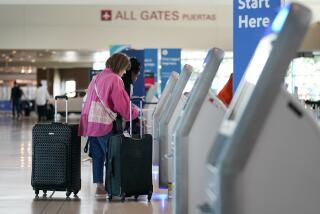Panel OKs Plan to Auction Unused Airwaves : Legislation: The bill, part of Presidentâs budget plan, aims to raise $7.1 billion by selling unused portions of the radio band to the highest bidder.
WASHINGTON â After weeks of setbacks on Capitol Hill, a key part of President Clintonâs troubled budget plan moved forward Tuesday when a Congressional panel approved a bill aimed at raising $7.1 billion by selling unused portions of the airwaves to the highest bidder.
Known as the Licensing Improvement Act of 1993, the measure would free up a portion of the radio band now held by the federal government that would auction it to wireless communications providers, such as cellular phone companies. The measure now goes before the House Budget Committee and will have to be reconciled with a similar Senate measure.
The bill, passed overwhelmingly by the House Committee on Energy and Commerce, marks a sharp departure in federal licensing policy, which now uses lengthy administrative hearings and/or lotteries to allocate communications licenses. The current system brings in almost no revenue for the government.
The committee passed the bill over the heated objections of state utility regulators and lawmakers from some rural districts who objected to a provision that would keep local authorities from regulating wireless communications providers. California regulators, among the most aggressive in their attempts to control cellular providers, said the provision would harm consumers.
Daniel Fessler, chairman of the California Public Utilities Commission, charged that the provision, which is backed by the nationâs largest cellular providers, was a direct response to the PUCâs move last month to force a cellular rate rollback in California, which has among the highest rates in the nation.
Supporters said the licensing measure would lead to more efficient use of the scarce airwaves and clear the way for faster deployment of new communications technologies, such as wireless portable computers, pocket-sized telephones, high-definition television and digital satellite radio.
âWe must reform and improve the current licensing process,â said Rep. Edward J. Markey (D-Mass.), who co-sponsored the bill and chairs the House telecommunications subcommittee. âThere has to be a better way to manage a precious federal resource than picking names out of a hat.â
The opponents contended that more local control over the new wireless communications providers was needed to ensure that sparsely populated communities are served and rates kept affordable.
âThere is too much money involved for us to move helter skelter (just) to close the budget gap,â asserted Rep. Mike Synar (D-Okla.). To move too hastily, warned Synar, would be to leave consumers unprotected from a communications industry whose twin themes âare greed and creamingâ off wealthy consumers while leaving others poorly served.
âWhen states are taken out of the loop, itâs left up to the FCC to police the industry and the FCC is already suffering from severe budgetary and personnel shortfalls,â added Michelle Harris, assistant director of congressional affairs at the National Assn. of Regulatory Utility Commissioners.
The Clinton Adminstration first proposed auctioning the airwaves in February. Similar proposals have died previously in Congress, however.
More to Read
Sign up for Essential California
The most important California stories and recommendations in your inbox every morning.
You may occasionally receive promotional content from the Los Angeles Times.










